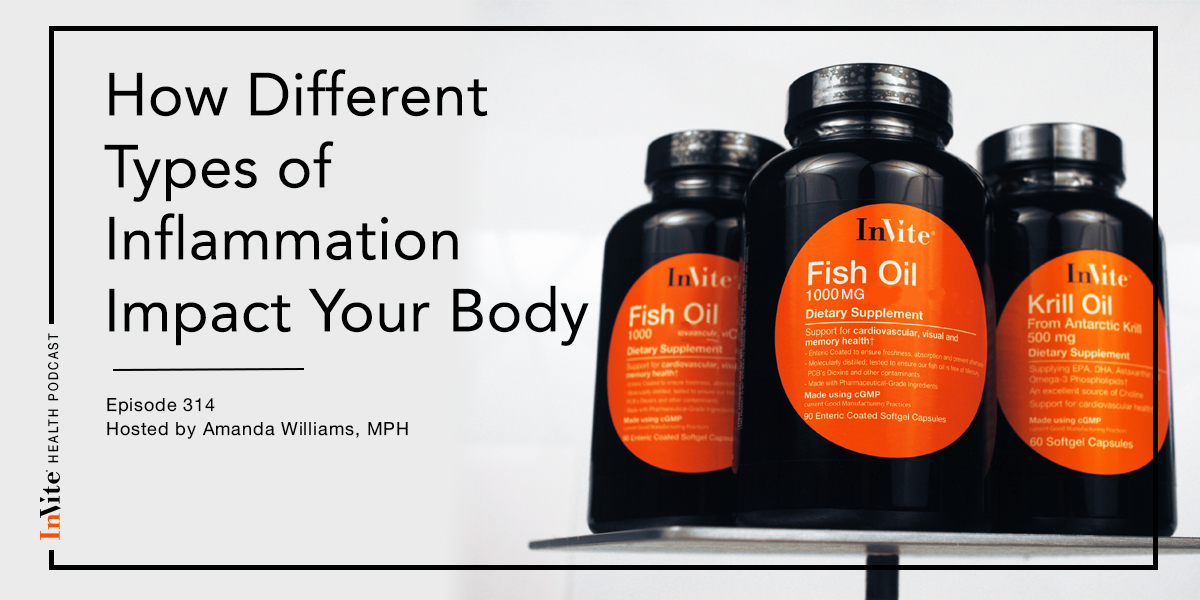How Different Types of Inflammation Impact Your Body – InVite Health Podcast, Episode 314

inflammation
Invite Health Podcast, Episode hosted by Amanda Williams, MPH
Subscribe Today!
You’ve probably heard by now that omega-3 fatty acids are incredibly important. When we talk about omega-3s, we’re referring to things coming from fish oil, krill oil, flaxseed and chia, for example. We know that they’re important because there are over 30,000 published research trials done on omega-3 fatty acids. They are essential to human existence. If we are not obtaining enough of them from our diet, it can affect so many different systems within our body, including the brain and heart. It goes far beyond those two areas and I want to talk in some detail today about the importance of omega-3 fatty acids and why you should make sure that you have them incorporated into your supplementation routine.†
We know that omega-3 fatty acids are an integral component to so many aspects of our overall health. When we think about things such as inflammation, we know that omega-3 fatty acids help to combat or offset that. That’s why I want to talk about it in more detail.
How different types of inflammation impact the body
First, we need to differentiate between acute and chronic inflammation. What we really want to pay attention to is that chronic, low-level inflammation. That’s what contributes to the pathogenesis of the most common chronic disease states, including heart disease, diabetes, cancers, Alzheimer’s disease, kidney disease and respiratory diseases such as COPD and emphysema. We know that low-level inflammation, this chronic forest fire that keeps burning throughout the body, this is why omega-3s are so incredibly important.†
Low DHEA Levels May Explain Chronic Inflammation – InVite Health Podcast, Episode 229. Listen Now >>
Acute inflammation, on the other hand, is a welcomed type of inflammation that occurs. This is a very well-controlled inflammatory response that actually has protective roles in the body. It helps to prevent the spread of infection throughout the body and prevent damage to different tissues. It helps to remove damaged tissues as well as those harmful pathogens. It allows the body to repair itself. At the most basic level, an acute inflammatory response is triggered in this setting. It’s a tissue injury or trauma that occurs within the body. Then we have infections, potentially by viruses, bacteria, parasites and fungi. We know there is a classic manifestation of acute inflammation that is characterized by the four cardinal signs of redness, heat, swelling and pain. The redness and the heat result from an increase in blood flow to the injury site itself. The swelling results from the accumulation of fluid at the injury site. As a consequence of this, we have increased blood flow and then we have swelling, which can become problematic because it can compress nerve endings and generate pain.†
We have to recognize that there is a clear and distinct difference between that warranted acute inflammation versus chronic inflammation. The chronic inflammation is what leads to long-term consequences, which is why I always refer to it in that setting of inflammaging.†
Learn more about inflammaging by listening to the full podcast episode.
The Importance of Omega-3 Fatty Acids
What can we do to combat this type of inflammatory assault to the system? First and foremost is a proper diet. We need to focus on eating nutrient-dense fruits and vegetables, avoiding sugars and bad carbohydrates, and increasing our intake of omega-3 fatty acids in our foods. Getting enough omega-3s can really prove to be difficult when people are following a Standard American Diet, which is predominantly omega-6 fatty acids. We are very limited in terms of our exposure to omega-3s.†
Fixing Nutrient Depletions In Vegan Diets – InVite Health Podcast, Episode 222. Listen Now >>
When we look at the different studies that focus in on chronic, low-grade inflammation and omega-3 fatty acids, we really start to see how it is that those omega-3s potentiate such a benefit in terms of easing inflammation within the body. Fish oil is a great source of omega-3 fatty acids. One of the best sources of fish oil if you’re not eating fatty fish such as salmon is to be taking a fish oil supplement or something like krill oil.†
Hear about various studies on the effects of omega-3 fatty acids on the body in the full podcast episode.
Thank you for tuning in to the Invite Health Podcast. You can find all of our episodes for free wherever you listen to podcasts or by visiting www.invitehealth.com/podcast. Make sure you subscribe and leave us a review! Follow us on Facebook, Twitter and Instagram at Invite Health today. We’ll see you next time on another episode of the Invite Health Podcast.


